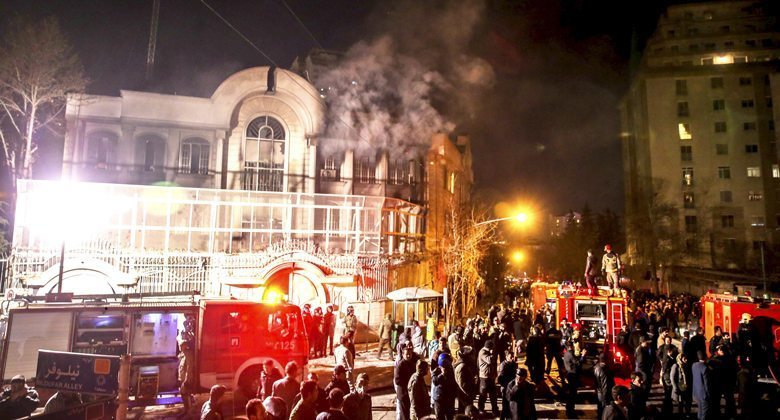

Bahrain also follows Saudi Arabia by announcing removal of Iranian ambassador
The UAE has announced it will downgrade its diplomatic representation in Iran after moves by its GCC allies Saudi Arabia and Bahrain to completely cut diplomatic ties with the Islamic republic.
The moves follow the ransacking of the kingdoms embassy in Tehran in reaction to Riyadh executing prominent Saudi Shia cleric Nimr al-Nimr.
In a statement on the official Emirates News Agency (Wam), Abu Dhabi said it would recall its ambassador in Tehran, reducing its diplomatic presence to a charge daffaires. Meanwhile it will reduce the number of Iranian diplomats stationed in the UAE.
This exceptional step has been taken in the light of Irans continuous interference in the internal affairs of Gulf and Arab states, which has reached unprecedented levels, said the statement.
Earlier on 4 January, Bahrain announced it is cutting diplomatic ties with Iran, giving Iranian diplomats in Manama 48 hours to leave. Sudan also announced it was severing ties with Iran.
The execution of Al-Nimr has widened a sectarian rift between Iran and Saudi Arabia, the respective main Shia and Sunni powers in the region.
The UAE and Bahrain, which both have Sunni-dominated governments, have close economic and political ties with Riyadh and form part of the six-member GCC.
It remains to be seen whether fellow GCC members Kuwait, Oman and Qatar will make any similar moves to reduce ties with Iran.
Al-Nimr and 46 others were executed in Saudi Arabia on 1 January, with the prominent Shia cleric having been convicted of terror-related offences.
On 3 January, Iranian protesters stormed the Saudi embassy in Tehran and set fires before being removed by police.
Later that day Saudi Arabia told all Iranian diplomats to leave Riyadh within two days, accusing Iran of undermining its security and planting terrorist cells in the region.
Iranian President Hassan Rouhani condemned the embassy attack and urged authorities to capture the protestors, but also spoke out against Al-Nimrs execution.
I have no doubt that the Saudi government has damaged its image, more than before, among the countries in the world, in particular [among] Islamic countries, by this unIslamic act, Rouhani said.
Iranian Supreme Leader Ali Khamenei also condemned the execution and called on the kingdoms western backers to speak out against the Riyadhs actions.
Saudi Arabia, which has long had strained relations with Iran, accused Tehran of interfering in regional politics. Irans history is full of negative interference and hostility in Arab issues, and it is always accompanied by destruction, said Saudi Foreign Minister Adel Al-Jubeir.
The two countries are involved in a proxy war in Syria, with Saudi Arabia supporting Sunni rebel groups against Bashar al-Assads Iran-backed government.
Meanwhile, Riyadh has accused Tehran of providing support for the Houthis in Yemen, where Saudi Arabia has led a coalition of Arab countries to try and restore elected president Abd al-Hadi to power.
You might also like...

Cyberattacks impact 44% of UAE retailers
24 April 2024

Abu Dhabi and Oman launch $180m tech fund
24 April 2024

Oman LNG wins key supply deals
24 April 2024

UAE and Oman firms sign $32bn energy deal
24 April 2024
A MEED Subscription...
Subscribe or upgrade your current MEED.com package to support your strategic planning with the MENA region’s best source of business information. Proceed to our online shop below to find out more about the features in each package.




